Meet the record breakers changing lives for the better in Portsmouth
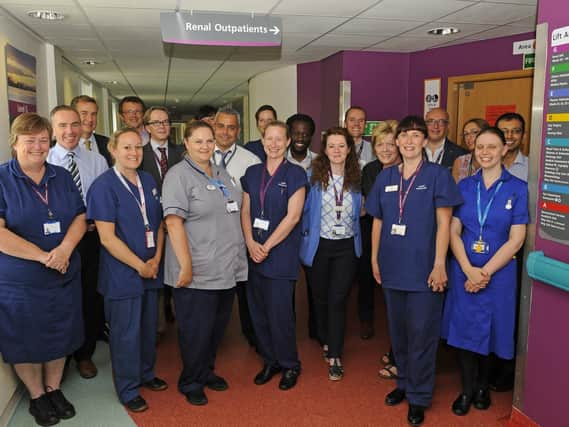

It was a record breaking year for one team at Queen Alexandra Hospital, who are paving the way for life-changing treatment
The Wessex Kidney Centre, based at the Cosham site, did 118 transplants in 2017/18 - its busiest year to date.
Advertisement
Hide AdAdvertisement
Hide AdWhen it first opened in 2004, it did 42 transplants but the centre treating more patients is something being celebrated by staff.
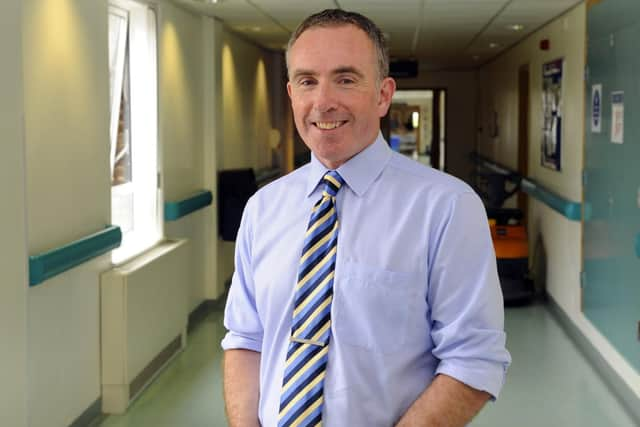

Paul Gibbs is clinical director for transplantation and renal surgery within the centre.
He is part of a massive team from biomedical scientists, who carry on biopsies on donor organs, and consultant histopathologists, who check to see a new organ is working, to the after-care nurses and staff dedicated to supporting living donors.
Mr Gibbs, a surgeon, says it is thanks to this team and everyone working together that the Wessex Kidney Centre has continued to progress.
Advertisement
Hide AdAdvertisement
Hide Ad'˜We as surgeons could not do what we do without the teams behind us,' he says.
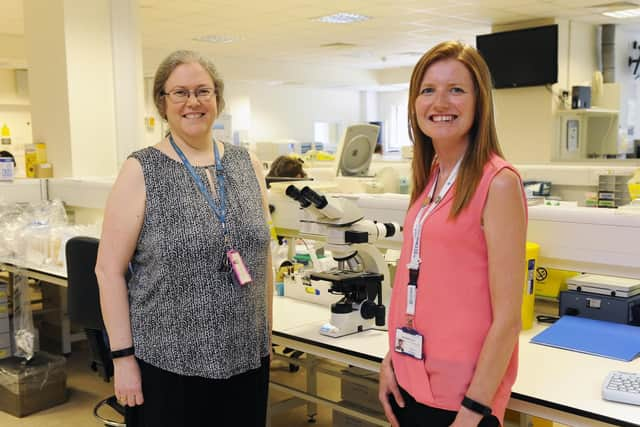

'˜We have people doing the post-operation care and answering the questions being asked by patients.
'˜It is the nurses and care teams who are helping them, giving them vital support and ensuring they know they are being looked after.
'˜I am part of a huge team, not even just based in this hospital.' The Wessex Kidney Centre has seen its number of transplants increase steadily with 87 in 2015/16 and 107 in 2016/17.Â
Advertisement
Hide AdAdvertisement
Hide AdMr Gibbs adds: '˜Over the past few years, we have been getting busier and busier.
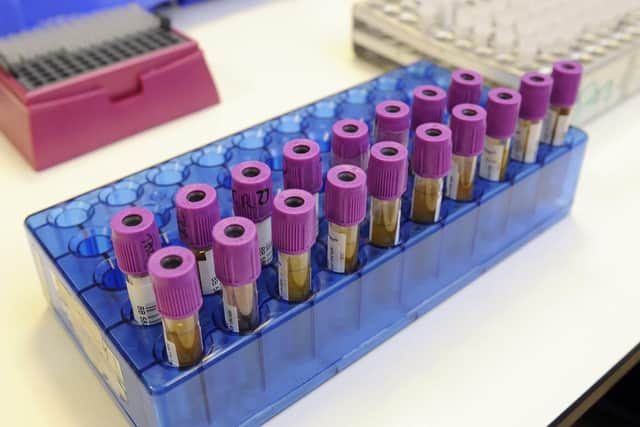

'˜That is something to celebrate and something to praise the staff for.
'˜In the year 2017/18 financial year we had 118 transplants of which 35 were from living donors. '˜The willingness all donors, living or not, and their families have shown and the difficult decisions they make have allowed us to have that year.
'˜It is important to us to support the families of donors and acknowledge the difficult times they have been through so a person can have an improved life.
Advertisement
Hide AdAdvertisement
Hide Ad'˜The on-going work of the wider NHS and promotion of donors has helped see more people become donors.'
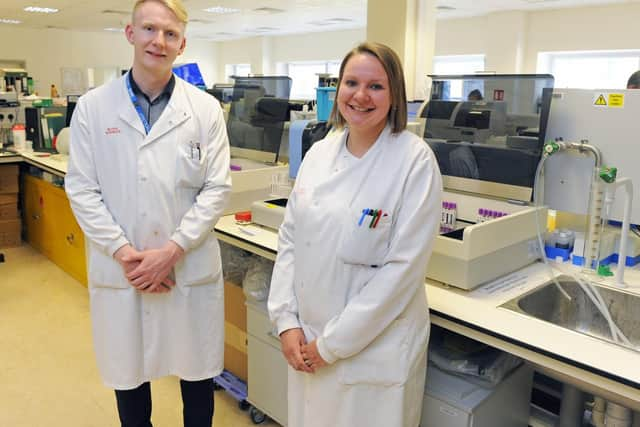

And as well as being its busiest ever year, this summer also marks 10 years since the centre carried out its first altruistic transplant, where the donor does not know the recipient. It was just the second time in the UK that a transplant of that kind was carried out with the first having taken place in Manchester the previous year.
The centre is also the second largest provider of altruistic donors, again only second to Manchester. Mr Gibbs adds: '˜For a centre based in a district hospital, and not a university hospital like many others, we are doing really well.
'˜Thanks to our donors and their families, we are giving people a second chance at life.
Advertisement
Hide AdAdvertisement
Hide Ad'˜We are giving them the chance to have a normal quality of life that other people take for granted.
'˜It is that difference that keeps this team dedicated and working hard to be the best we can.'
'˜To see the transformation in people is just incredible'
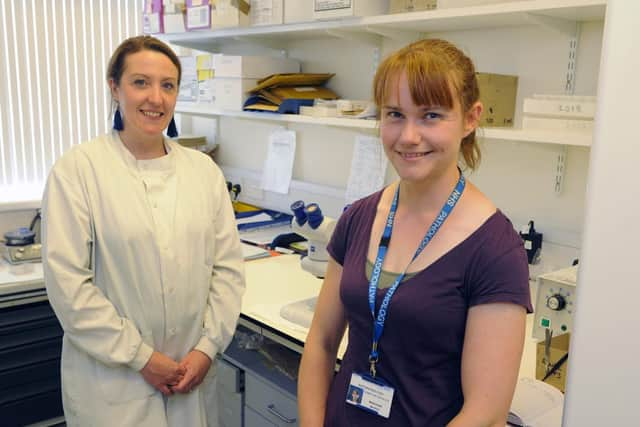

Last year, Queen Alexandra Hospital had its highest number of living donors with 35 of its 118 kidney transplants coming from living people.
The kind-hearted people will to give up one of their kidneys are supported by the Wessex Kidney Centre's living donor co-ordinators.
Advertisement
Hide AdAdvertisement
Hide AdThey make sure the patients know everything they need to and help them through what can be an emotional time.
Rebecca Rowsell, from the team, said she is proud of their work and spoke highly of altruistic donors.
'˜Our job is to assess the people coming forward as a living kidney donor, either for a relative or an altruistic donor.
'˜We are one of the top centres in the UK for altruistic donors and have donated 57 kidneys into the national pool.
Advertisement
Hide AdAdvertisement
Hide Ad'˜We need to make sure the donors know exactly what they have put themselves forward for and organise all the tests they need to have.Â
'˜We never know how long we will be supporting a patient for, it takes as long as it takes.'
The team do a full set of blood tests, urine tests, blood pressure checks and do chest x-rays.They also do a test to see which is the best kidney to be removed as well as checking both kidney's function to ensure the one they have left will keep them healthy.
As part of their tests, they also look at someone's mental health.
Advertisement
Hide AdAdvertisement
Hide AdRebecca says: '˜It is a big thing to give someone a kidney so we have to make sure they are health enough in all senses to do that.'
Lucy Chester, also from the team, adds: '˜We try to do make everything we do cater around the patients.
'˜We work our services to their needs rather than the other way around. We try to make it very friendly and professional.'
While the living donor co-ordinators care for the donors before the operation, the Wessex Kidney Centre has another team dedicated to post transplant care.
Advertisement
Hide AdAdvertisement
Hide AdThe five specialist nurses care for the patients and help with their recovery from the surgery itself to any lifestyle changes they might have to make.
Sarah Milsom-McQuillan, from the team, says: '˜When someone has had long-term renal failure or dialysis they have very strict dietary needs.
'˜They cannot drink that much and have to be careful with what they need but after the transplant, they can eat anything they want to.
'˜It can be quite difficult for people to adjust to their new lifestyles if they have been stuck in their ways for so long.
Advertisement
Hide AdAdvertisement
Hide Ad'˜As well as their diet, for many people they can take up new hobbies and return to work.
'˜It is a wonderful feeling though when you hear about the difference the transplant has made.'
Some people can wait more than two years for a new transplant and specialist nurse Trudi Bennett said it can be hard watching people on the waiting list.
'˜Life on dialysis or with a long-term condition is horrible,' she says.
Advertisement
Hide AdAdvertisement
Hide Ad'To see the transformation of someone's life after the transplant is incredible, it is the best part of the job.'
Meet the scientists who make sure every operation goes as smoothly as possible
Behind the scenes of every transplant is a network of scientists, laboratories and tests being carried out to ensure patients have the best possible outcome.
From checking the new organ will be suitable to seeing if it has been accepted by its new body, the microbiology, histology and blood sciences departments at Queen Alexandra Hospital are there every step of the way.
Advertisement
Hide AdAdvertisement
Hide AdIt is their job to look below the surface and aid the surgeons and clinical teams in their treatment of patients.
Allyson Lloyd is the operational manager in the microbiology department, one of two in the region.
She says: '˜There are only two sites that do organ donor screening in this area with others based in London, Bournemouth and Plymouth.
'˜We work for two transplant teams, St Richards Hospital in Chichester cover up to London but still send samples to us for analysing. We offer these services 365 days, 24 hours a day and look at organ donations.
Advertisement
Hide AdAdvertisement
Hide Ad'˜Anybody in the community could receive organs sent to us. Teams come in and take different organs and here at QA we are particularly interested in kidneys. We also receive calls for patients who need a kidney transplant.
'˜We screen the patients for a whole range of different infectious diseases to make sure there's nothing in their background that could compromise when they have the transplant.
'˜We screen them at the time of the transplant operation as well to make sure nothing has changed.' While the microbiology team are testing the patients and ensuring they receive the correct donation, the histology laboratory at QA Hospital uses biopsies to see how well they are doing after the transplant.
They look for signs of rejection or other illnesses which could be an underlying problem post-operation.
Advertisement
Hide AdAdvertisement
Hide AdMarianne Mason, consultant histopathologist, says: '˜This is where we get the biopsies from transplant patients.
'˜If ever patients are unwell or it's not recovering fully as expected we will do a core biopsy. The clinical teams send the tissue for us to look at.
'˜We have biomedical scientists who process the biopsies and we put them on glass slides before looking under a microscope.
'˜We can see if there are signs of rejection for example and feed that back.
'˜The teams can then adjust treatment accordingly,
Advertisement
Hide AdAdvertisement
Hide Ad'˜For as long as a patient is having follow-up appointments, they will have biopsies to check the transplant is working.'
Another department which is key in the transplant journey is Blood Sciences. They do all the renal screening of patients waiting for a kidney transplant.
Jenny Poynton, senior biomedical scientist, says: '˜For patients waiting for the donation, we will do all of their screenings to check their functions.
'˜That will determine if the best step going forward in the lead up to the transplant. We keep up with that while they are on the waiting list.'
Advertisement
Hide AdAdvertisement
Hide AdThree immunosuppressants drugs are used to help people' bodies accept their new organ and it is the Blood Sciences team to monitor their effectiveness.
Jenny adds: '˜We do drug testing on a daily basis. We find what suits them and what is making the best improvements.
'˜We have to get the three drugs right, it is very fine balance. If we don't give them enough, they can reject the organ '“ but if we give them to much it can damage the kidney.'